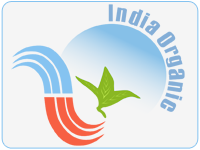 Introduction:
Introduction:
Organic products are grown under a system of agriculture without the use of chemical fertilizers and pesticides with an environmentally and socially responsible approach. This is a method of farming that works at grass root level preserving the reproductive and regenerative capacity of the soil, good plant nutrition, and sound soil management, produces nutritious food rich in vitality which has resistance to diseases.
India is bestowed with lot of potential to produce all varieties of organic products due to its various agro climatic conditions. In several parts of the country, the inherited tradition of organic farming is an added advantage. These holds promise for the organic producers to tap the market which is growing steadily in the domestic and export sector.
As per the available statistics, India rank 2nd in terms of World's Organic Agricultural land and 1st in terms of total number of producers. (Source: FIBL & IFOAM Yearbook, 2024).
The APEDA, Ministry of Commerce & Industries, Government of India is implementing the National Programme for Organic Production (NPOP). The programme involves the accreditation of Certification Bodies, standards for organic production, promotion of organic farming and marketing etc. The NPOP standards for production and accreditation system have been recognized by European Commission and Switzerland for unprocessed plant products as equivalent to their country standards. With these recognitions, Indian organic products duly certified by the accredited certification bodies of India are accepted by the importing countries. APEDA is also in the process of negotiation with Australia, South Korea, Taiwan, Canada, Japan etc.
Production:
India produced around 3.6 million MT (FY 24) of certified organic products which includes all varieties of food products namely oil seeds, fibre, sugarcane, cereals &millets, cotton, pulses, aromatic &medicinal plants, tea, coffee, fruits, spices, dry fruits, vegetables, processed foods etc. The production is not limited to the edible sector but also produces organic cotton fiber, functional food products etc.
Among different states Maharashtra is the largest producer followed by Madhya Pradesh, Rajasthan, Karnataka, and Gujarat. In terms of commodities, fiber crops are the single largest category followed by oil seeds, sugar crops, cereals and millets, medicinal/ herbal and aromatic plants, spices &condiments, fresh fruit vegetable, pulses, tea &coffee.
| Production in FY24’ (Mil MT) | |
| Organic Products | 3.6 |
Area:
The total area under organic cultivation in India during FY 24 is 7.3 million ha. This includes as follows:
Area under Organic Cultivation in FY24’ (Mil ha) | |
| Farm Area | 4.5 |
| Wild Area | 2.8 |
Among all the states, Madhya Pradesh has covered largest area under organic certification followed by, Maharashtra, Rajasthan, Gujarat, Odisha, Sikkim, Uttar Pradesh, Uttarakhand, Kerala, Karnataka, and Andhra Pradesh.
Exports:
Organic products are exported to USA, European Union, Canada, Great Britain, Sri Lanka, Switzerland, Vietnam, Australia, Thailand, New Zealand, Japan, Korea Republic etc.
| Volume of export FY24 (lakh MT) | Amount (USD Mil) | |
| Organic Food | 2.61 | 494.80 |







